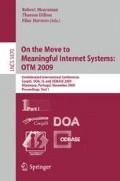Abstract
In Computer Supported Cooperative Work (CSCW), it is crucial for project leaders to detect conflicting situations as early as possible. Generally, this task is performed manually by studying a set of documents exchanged between team members. In this paper, we propose a full-fledged automatic solution that identifies documents, subjects and actors involved in relational conflicts. Our approach detects conflicts in emails, probably the most popular type of documents in CSCW, but the methods used can handle other text-based documents. These methods rely on the combination of statistical and ontological operations. The proposed solution is decomposed in several steps: (i) we enrich a simple negative emotion ontology with terms occuring in the corpus of emails, (ii) we categorize each conflicting email according to the concepts of this ontology and (iii) we identify emails, subjects and team members involved in conflicting emails using possibilistic description logic and a set of proposed measures. Each of these steps are evaluated and validated on concrete examples. Moreover, this approach’s framework is generic and can be easily adapted to domains other than conflicts, e.g. security issues, and extended with operations making use of our proposed set of measures.
Access this chapter
Tax calculation will be finalised at checkout
Purchases are for personal use only
Preview
Unable to display preview. Download preview PDF.
References
Baader, F., Calvanese, D., McGuinness, D.L., Nardi, D., Patel-Schneider, P.F. (eds.): The Description Logic Handbook: Theory, Implementation, and Applications. Cambridge University Press, Cambridge (2003)
Bigi, B., Brun, A., Paul Haton, J., Smaili, K., Zitouni, I.: A comparative study of topic identification on newspaper and e-mail. In: Proceedings of the String Processing and Information Retrieval Conference, SPIRE 2001 (2001)
Broches, R.S.: Unraveling the Hawthorne Effect: An Experimental Artifact ’Too Good to Die’. PhD thesis, University of Wesleyan (April 2008)
Cortes, C., Vapnik, V.: Support vector networks. Machine Learning, 273–297 (1995)
Crammer, K., Singer, Y., Cristianini, N., Shawe-taylor, J., Williamson, B.: On the algorithmic implementation of multiclass kernel-based vector machines. Journal of Machine Learning Research 2, 2001 (2001)
Denoual, E.: Méthodes en caractères pour le traitement automatique des langues. PhD thesis, University of Joseph Fourier (2006)
Dias, G.: Extraction automatique d’associations lexicales à partir de corpora. PhD thesis, University of Orleans (December 2002)
Dubois, D., Lang, J., Prade, H.: Possibilistic logic. In: Gabbay, D., Hogger, C., Robinson, J., Nute, D. (eds.) Handbook of Logic in Artificial Intelligence and Logic Programming, vol. 3, pp. 439–513. Oxford University Press, Oxford (1994)
Eden, L.: Multinationales en Amrique du Nord. illustrated (1994)
Enguehard, C., Pantera, L.: Automatic natural acquisition of a terminology. Journal of Quantitative Linguistics 2(1), 27–32 (1995)
Francisco, V., Gervás, P., Peinado, F.: Ontological reasoning to configure emotional voice synthesis. In: Marchiori, M., Pan, J.Z., Marie, C.d.S. (eds.) RR 2007. LNCS, vol. 4524, pp. 88–102. Springer, Heidelberg (2007)
Garcia-Rojas, A., Vexo, F., Thalmann, D., Raouzaiou, A., Karpouzis, K., Kollias, S.: Emotional Body Expression Parameters In Virtual Human Ontology. In: Proceedings of 1st Int. Workshop on Shapes and Semantics, pp. 63–70 (2006)
Haton, J., Cerisara, C., Fohr, D., Laprie, Y., Smaili, K.: Reconnaissance automatique de la parole. Du signal à son interprétation. Dunod (2006)
Larivery, M.: Les genres d’émotions. La lettre du psy 2(7) (July 1998)
Lavecchia, C., Smaili, K., Langlois, D., Haton, J.-P.: Using inter-lingual triggers for machine translation. In: Eighth conference INTERSPEECH (2007)
Mathieu, Y.Y.: Annotation of emotions and feelings in texts. In: Tao, J., Tan, T., Picard, R.W. (eds.) ACII 2005. LNCS, vol. 3784, pp. 350–357. Springer, Heidelberg (2005)
McIntyre, G., Göcke, R.: Towards Affective Sensing. In: Jacko, J.A. (ed.) HCI 2007. LNCS, vol. 4552, pp. 411–420. Springer, Heidelberg (2007)
Robertson, S.E., Jones, S.K.: Relevance weighting of search terms. Journal of the American Society for Information Science 27(3), 129–146 (1976)
Salton, G., Mcgill, M.J.: Introduction to Modern Information Retrieval. McGraw-Hill, Inc., New York (1986)
Salton, G., Wong, A., Yang, C.S.: A vector space model for automatic indexing. Commun. ACM 18(11), 613–620 (1975)
Voltz, R., Oberle, D., Staab, S., Motik, B.: Kaon server - a semantic web management system. In: Alternate Track Proceedings of the Twelfth International World Wide Web Conference, Budapest, Hungary, May 2003, pp. 139–148. ACM, New York (2003)
Weston, J., Watkins, C.: Multi-class support vector machines (1998)
Whittaker, S., Sidner, C.: Email overload: exploring personal information management of email. In: CHI 1996: Proceedings of the SIGCHI conference on Human factors in computing systems, pp. 276–283. ACM Press, New York (1996)
Xu, L., Lin, H.: Ontology-driven affective chinese text analysis and evaluation method. In: Paiva, A.C.R., Prada, R., Picard, R.W. (eds.) ACII 2007. LNCS, vol. 4738, pp. 723–724. Springer, Heidelberg (2007)
Yan, J., Bracewell, D.B., Ren, F., Kuroiwa, S.: The creation of a chinese emotion ontology based on hownet. Engineering Letters 16(1), 166–171 (2008)
Yang, Y., Liu, X.: A re-examination of text categorization methods (1999)
Zacklad, M.: Communities of action: a cognitive and social approach to the design of cscw systems. In: GROUP 2003: Proceedings of the 2003 international ACM SIGGROUP conference on Supporting group work, pp. 190–197. ACM Press, New York (2003)
Zhu, B., Chen, H.: Communication-garden system: Visualizing a computer-mediated communication process. Decis. Support Syst. 45(4), 778–794 (2008)
Author information
Authors and Affiliations
Editor information
Editors and Affiliations
Rights and permissions
Copyright information
© 2009 Springer-Verlag Berlin Heidelberg
About this paper
Cite this paper
Zakaria, C., Curé, O., Salzano, G., Smaïli, K. (2009). Formalized Conflicts Detection Based on the Analysis of Multiple Emails: An Approach Combining Statistics and Ontologies. In: Meersman, R., Dillon, T., Herrero, P. (eds) On the Move to Meaningful Internet Systems: OTM 2009. OTM 2009. Lecture Notes in Computer Science, vol 5870. Springer, Berlin, Heidelberg. https://doi.org/10.1007/978-3-642-05148-7_9
Download citation
DOI: https://doi.org/10.1007/978-3-642-05148-7_9
Publisher Name: Springer, Berlin, Heidelberg
Print ISBN: 978-3-642-05147-0
Online ISBN: 978-3-642-05148-7
eBook Packages: Computer ScienceComputer Science (R0)

